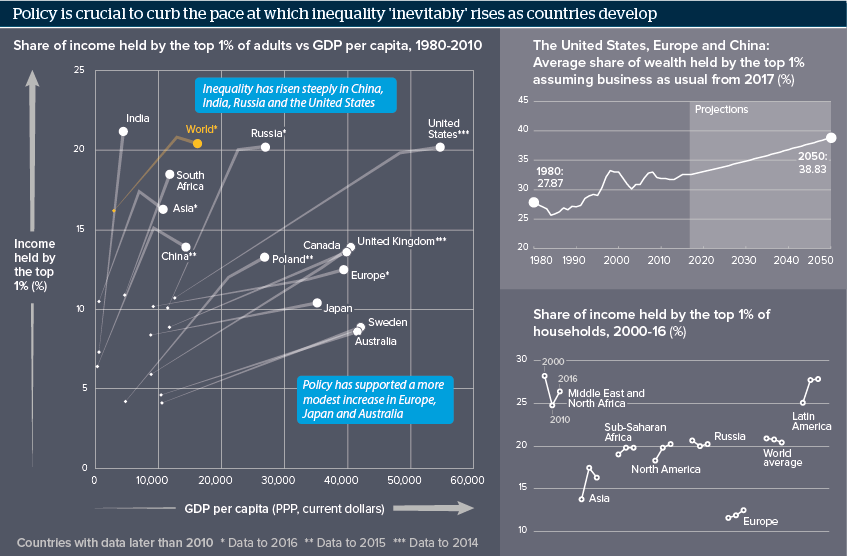Policy is key to curbing the forces driving inequality
The rich are getting richer globally but policies fostering redistribution, diversification and growth can check this
Source: World Inequality Report 2018, IMF World Economic Outlook
Outlook
An IMF paper this month exploring 147 countries finds that from 1970-2014 the income gains from globalisation were concentrated at the top of national income distributions, adding to research showing that technological advances have widened inequality in recent decades.
Net wealth is a broader measure of household finances, and policy is crucial; 1% of US households hold 39% of the wealth, compared with 30% in China and 24% in France. By 2012, US wealth held by the top 0.1% equalled that of the bottom 90%. Nonetheless, countering suspicions that inequality drives populism, there was no correlation across US states between income held by top 1% and the share voting for Donald Trump.
Impacts
- Curbing executive pay and bonuses is key; caps on bonuses as a share of pay will increase but there are worries about stifling innovation.
- Political support concerns can deter efforts to tax these individuals more, but for major tech firms the EU is planning a 3% turnover tax.
- Political stability matters -- Europe is the most equal continent but redistribution will come under pressure amid rising fragmentation.
- Diversification is key -- Middle East inequality fell up to 2010, aided by the oil boom, but rose when prices fell.
- Growth prospects matter -- Latin America is the most unequal continent but will struggle to fund redistribution and reforms on low growth.
See also
- Vietnam will highlight clampdown on human trafficking - Oct 28, 2019
- Debate deepens among stagnationists and technologists - May 7, 2019
- US policy has the flexibility to aid inflexible places - Feb 25, 2019
- Prospects for the future of work in 2019-23 - Dec 3, 2018
- Latin America's wealthiest untouched by redistribution - Sep 14, 2018
- Firms are key to advancing equality and productivity - Sep 11, 2018
- Policy can support global finance and welfare - Aug 31, 2018
- Technology is widening wealth inequality in India - Jun 14, 2018
- Prospects for the global economy in 2018 - Nov 1, 2017
- More graphic analysis
